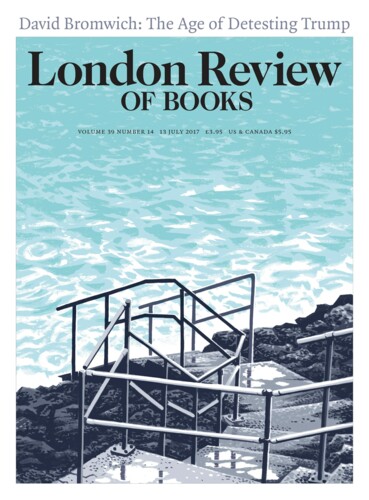On 13 December, the New York Timespublished an article on the scrubbing of Kevin Spacey’s performance as J. Paul Getty from final prints of the film All the Money in the World. A fast reshoot had slotted Christopher Plummer into every scene that included Spacey; the dazzled reporter, Brooks Barnes, paid homage to the genius and alacrity of the director, Ridley Scott; and they called it in the print edition ‘Daring Act to Save Face’ – a sort of sick pun, and the matter is not so cute when you think about it. Scott was prompted by his recognition that the accusations against Spacey, from unwanted touch to groping to rape – which may turn out to be true, false or exaggerated, in unknown combinations – would damage the box-office take of All the Money in the World. Accordingly, he reworked the film against his original vision, in order to guard against a boycott. The boycott, however, was only speculative; the expunging and substitution were real.
David Bromwich
David Bromwich, Sterling Professor of English at Yale, is the author of many books, including Hazlitt: The Mind of a Critic, Moral Imagination: The Intellectual Life of Edmund Burke and How Words Make Things Happen.
Donald Trump Jr was approached last summer by a publicist, Rob Goldstone, acting on behalf of a Russian lawyer, Natalia Veselnitskaya, who offered the Trump campaign ‘very high level and sensitive information’ about Hillary Clinton’s dealings with Russia. The response by Donald Jr was not high-minded: ‘If it’s what you say, I love it.’ Apparently the offer of information turned out to be an empty pretext. The instigator of the meeting was a pop musician, Emin Agalarov, the son of a businessman, Aras Agalarov – a name that also came up in the ‘dodgy dossier’ on Trump collected by the ex-MI6 agent Christopher Steele. Trump Senior had taken money from Agalarov, and in return provided Miss Universe contestants for use in a music video by Emin. American billionaires and Russian oligarchs may be supposed to share an elective affinity. They are members of an international tribe, and snap their fingers at sovereignties.
Who’s in Charge?
12 July 2017
The Age of Detesting Trump
David Bromwich, 13 July 2017
Impeachment is not something to count on. ‘Foreign emoluments’ is the most plausible charge, but the phrase has a distant sound and one of the words will need explaining. And yet, the idea of a left-liberal-engineered overthrow of Trump, assisted by the intelligence community and lawyers of great genius, has a tremendous, unquenchable charm for the media.
James Comey was the acting attorney general of the United States in March 2004 when two emissaries from the Bush White House marched to the hospital bed of the attorney general, John Ashcroft, and asked him to renew the warrantless mass surveillance programme code-named Stellar Wind – a programme whose legality had been questioned by the Office of Legal Counsel. Comey, who is six foot eight, stood between the White House flunkies and the sick man’s bed, and they retreated. Soon after, he informed Bush that if the secret programme were reauthorised over the objections he had seen, he himself and the head of the FBI, Robert Mueller, would lead a mass resignation from the justice department. Bush fell back; and a chink opened in the system whose vastness and illegality would eventually be exposed by Edward Snowden. It was one of very few moments in the Bush-Obama years that bore the stamp of civic courage: someone inside government had been willing to sacrifice his career to uphold the constitution. So when, in September 2013, President Obama appointed Comey as the next director of the FBI, the move was generally applauded.
Pieces about David Bromwich in the LRB
I prefer my mare: Hardy’s Bad Behaviour
Matthew Bevis, 10 October 2024
Not unlike the God he complains about, Thomas Hardy’s smilingness is often in league with his sadism, and writing poetry was a way for him to plead innocent and guilty at the same time.
No Theatricks: Burke
Ferdinand Mount, 21 August 2014
There were at least six great issues on which Burke defended the victims of mistreatment with a steely vigour and an unhesitating sympathy.
Bumming and Booing: William Wordsworth
John Mullan, 5 April 2001
David Lurie, the soured academic who is the protagonist of J.M. Coetzee’s novel Disgrace, earns his living as a professor of ‘communications’ in a Cape Town university (his...
The centre fights back
Lynn Hunt, 22 July 1993
Thanks to David Mamet’s new play Oleanna, the distracted, bumbling and self-regarding male professor has now become the archetypal victim of political correctness. Mamet’s John is...
Fiery Participles
D.A.N. Jones, 6 September 1984
Hazlitt is sometimes rather like Walt Whitman, democratic, containing multitudes, yet happy with solitary self-communion. In a pleasant essay called ‘A Sun-Bath – Nakedness’,...
Read anywhere with the London Review of Books app, available now from the App Store for Apple devices, Google Play for Android devices and Amazon for your Kindle Fire.
Sign up to our newsletter
For highlights from the latest issue, our archive and the blog, as well as news, events and exclusive promotions.


